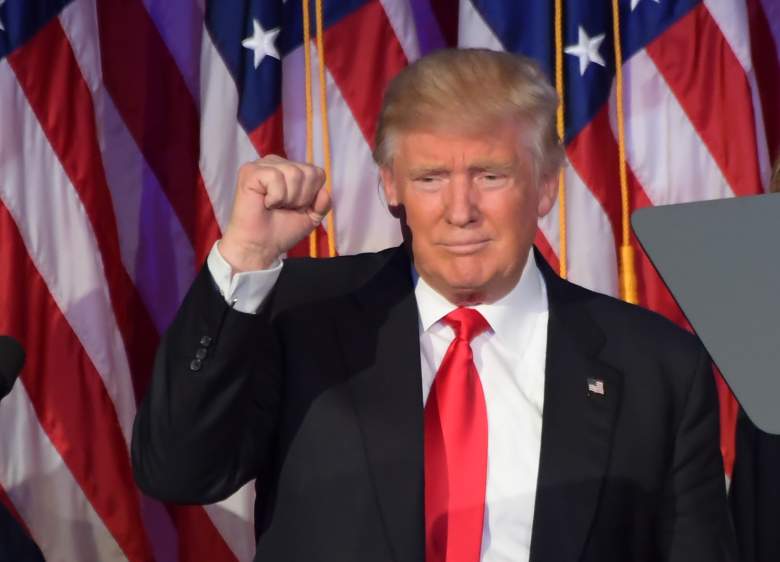
Republican presidential elect Donald Trump gestures after speaking during election night at the New York Hilton Midtown in New York on November 9, 2016. (Getty)
Donald Trump has won the presidency. After trailing in nearly every poll, Trump won the Electoral College and will take over the Oval Office. His victory shocked the world as perhaps the biggest political upset of our lifetime. Now many are wondering what comes next, especially in regards to his business dealings.
Could Trump serve as president of the United States and still keep his job as chairman of the Trump Organization? Technically the answer is yes, although that is an unlikely scenario. Trump has indicated he will step down as chairman, but there is still much uncertainty surrounding his plans for the organization.
Historically, presidents have arranged their financial affairs in a manner that prevents the appearance of conflicts of interest, however there is no law requiring them to do so.
It’s common for elected officials to use a blind trust to avoid potential conflicts. In this legal arrangement, an independent trustee takes over an official’s investment portfolio, which means the official cannot direct or advise the trustee on investment decisions.
A blind trust works for liquid assets including stocks, bonds, and other financial instruments. While Trump’s portfolio presumably includes plenty of those, his biggest assets are his properties, hotels, and golf courses, all which prominently carry the Trump brand. When an independent trustee takes over an official’s portfolio, the official operates without knowledge of where or how money is invested. As long as Trump’s personal brand remains central in his business, a blind trust would be nearly impossible since companies buy rights to use the Trump name on buildings and products.
As Newsweek pointed out, “it will be awfully difficult for Trump not to know what the Trump Organization is up to if, on a state visit to Russia, he sees ‘Trump Tower Moscow’ on a high-rise there.”
When Trump was asked about setting up a blind trust earlier this year during a GOP debate, Trump indicated that instead, his three oldest children will run the organization.
If I become president, I couldn’t care less about my company. It’s peanuts. I want to use that same — up here, whatever it may be — to make America rich again, and to make America great again. I have Ivanka and Eric and Don sitting there. Run the company, kids. Have a good time. I’m going to do it for America. … I would put it in a blind trust. Well, I don’t know if it’s a blind trust if Ivanka, Don and Eric run it. But — is that a blind trust? I don’t know. But I would probably have my children run it with my executives. And I wouldn’t ever be involved, because I wouldn’t care about anything but our country. Anything.
If his children fully take over the company, the real estate mogul will still be closely connected to the business and its dealings. In September, Trump attempted to clarify his plans for the Trump Organization in a phone interview on Fox News.
“I will sever connections and I’ll have my children and my executives run the company and I won’t discuss it with them. It’s just so unimportant compared to what we’re doing about making American great again,” the real-estate developer said. “I would absolutely sever, I would have nothing to do with my company,” Trump added.
Of Trump’s five children, Ivanka, Donald Jr., and Eric have taken on prominent roles in his campaign. They also have high positions within the Trump Organization, each serving as executive vice presidents.
A Newsweek article published in September raised concerns over the possible conflict of interest considering the Trump Organization’s foreign business dealings. Senior writer Kurt Eichenwald wrote, “if Trump moves into the White House and his family continues to receive any benefit from the company, during or even after his presidency, almost every foreign policy decision he makes will raise serious conflicts of interest and ethical quagmires.”
As president, Trump will be in a position to make decisions on the U.S. economy and foreign policy that could affect his family’s bottom line.